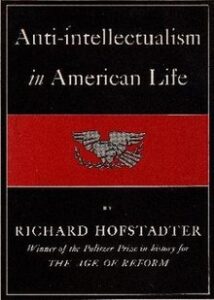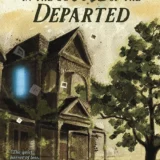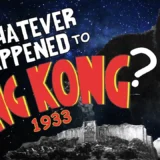
- Publisher: Alfred A. Knopf
- Publish Date: 1969
- Copyright Date: 1962
- Pages: 434
- Author: Richard Hofstadter
- ISBN (The version I read from the library pre-dated ISBN, but a more recent edition):
- ISBN13: 9780394703176
- ISBN10: 0394703170
Anti-intellectualism in American Life by Richard Hofstadter is the 1964 Pulitzer Prize winner for non-fiction books. It provides an historical perspective of American views of intellectuals and intellectualism since before the formation of the USA. Written over the course of the 1950’s into the 1960’s, even the most current subject matter of this book is an historical perspective today.
My reviews are mostly about science fiction and science related books. This one is more history and perspective than directly science related, but I think it is applicable to folks interested in science and scientific accuracy in science fiction and society in general. I have worried lately about leaders in our country celebrating ignorance and lack of education. There are too many people who willfully ignore data and facts and support, without evidence, weird conspiratorial theories about such things as: vaccines, alien visitors, Illuminati, Big Foot, chem trails, elections, crisis actors, and even the shape of the Earth (flat or not?).
The book does not address any of these particulars, but it does talk to the historical tendency for Americans to distrust intellectuals. This began with the first European immigrants to the continent who distrusted the church hierarchy and wanted to worship under their own frame of reference. The old Church (of England, Roman Catholic, etc.) were largely dependent on scholarly leaders who performed research, analysis and interpretation of scriptures and other historical information, and then presented this information to their congregations. This leadership, generally, were very highly educated for the time. The new Americans had a much higher belief in a ‘personal’ religious experience where anyone, regardless of their educational background, could experience the scriptures and interpret for themselves. They did not trust church hierarchy to deliver ‘true’ interpretations, translations, etc.
Since many of the early colleges and universities in the Americas were sponsored by one of the formal churches, this skepticism of the church expanded to include skepticism of higher learning and those who took part. The education of things like Latin and classical literature seemed out of touch with the day-to-day life of the average American.
Over the years, this apprehension of intellectuals has continued. It has waxed and waned at different periods of our history, but has maintained itself. One period where intellectualism surged in popularity was during the forming of the USA. The founding fathers were, in general, among the most educated and most intellectually gifted. They were also trusted by a large percentage of the population. Unfortunately, this was a relatively short period of our history.
As the country expanded and the population became more dispersed, they depended less and less on the formal institutions of the church, governments, education, etc. For religion, they came to depend on a few traveling ministers, and often, someone from the community with no formal training who served as a minister on Sunday, and was just another farmer during the week. School, if it happened at all, was also led by someone from the community and did not require any formal certification or education. All of this lead to an increasing distrust of the ‘outsiders’ with the ‘book learnin’ when they did come around and try to influence the locals. It bred a mistrust of external expertise, even when that expertise could have helped them with things such as crop yields, productivity, etc.
The book continues with the history from these early days up through the writing of the book including issues with various evangelical movements of the 19th and early 20th century, McCarthyism’s attacks on intellectuals as ‘communists’ in the 1950’s, and more. I have to admit that I was both heartened and disheartened after reading Anti-intellectualism in American Life. It was good to learn that the focus on feeling and outrage over facts that is prevalent today is not a new occurrence. In fact, this has probably been the norm over most of our history. It is encouraging to know that we have dealt with this for centuries and survived and grown. It is discouraging that after four or five centuries, we still place so little emphasis on, and trust in, facts, data and well earned expertise. Popularity is still not a substitute for competence, experience and knowledge.
This is not an easy book to read. It is written in a very scholarly style. Also, being over 60 years old, many of the ‘current’ references that the author mentions were unfamiliar to me and are not usually explained. This book about anti-intellectualism is written for an intellectual audience. I would not recommend this book for the casual reader, but if you are willing to put in the effort, there is a lot of great information within these pages.
_______
For a book that is much easier to read, and still (mostly) scientifically accurate:
Plastiphobia – aka Plastivore by Matt Truxaw
Matt Truxaw’s newest book is Monster, which released on 1/12/2026. This urban fantasy, horror, thriller will keep you turning the pages.
He is also the author of the hard science fiction thrillers: “Plastiphobia/Plastivore” and “Anthrophobia: A Teacher’s Tale”
You can find them all on Amazon in Paperback, Hardback, Kindle and/or free to read with Kindle Unlimited.
When you read any of them, he would really appreciate a review/rating on Amazon or your favorite book seller/book reader site.
More about Matt:
He was born in Orange County California many years ago and he still lives there. He has been reading books for most of those years and writing up book reviews for the last few years. He gets most of his books out of the library so expect a lot of old science fiction classics book reviews and other science related reviews in addition to newer books he comes across.
If you want to be ‘in-the-loop’ on these and other works, you can follow his author’s page on Amazon or his Facebook page.
For more reviews and articles by Matt here on Amazing Stories (Click here).












